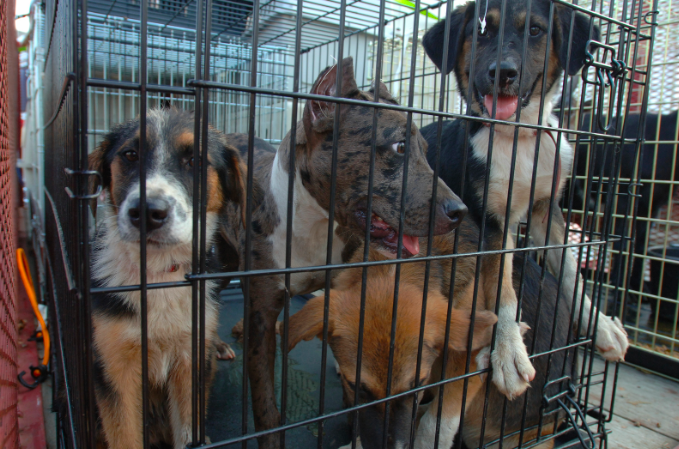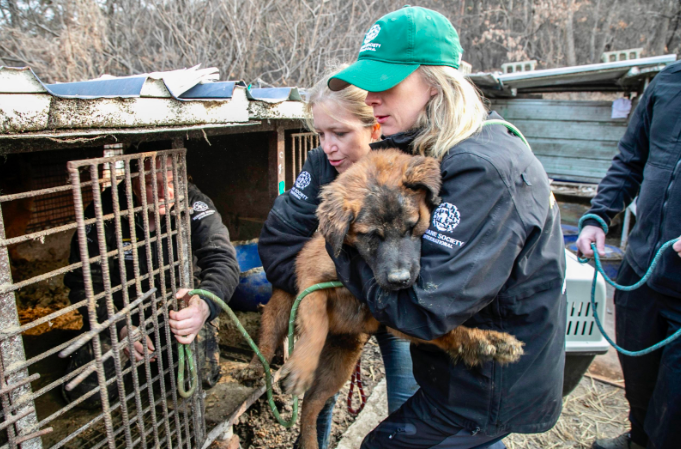South Korea contemplates banning dog meat industry
By Isabelle Houston ‘25
Photograph from Nara & Dvids Public Domain Archive
The dog meat industry has deep roots in South Korea and is increasingly changing, with attention being brought to the neglectful practices of the trade and animal rights.
Dog meat farmer, who only released his surname of Yang, in the Chungcheong province of South Korea joined Humane Society International’s (HSI) phase-out model program to sustainably end the dog meat industry in early March.
After 30 years in the trade, Yang, a 73- year old dog farmer, worked with HSI/Korea(the South Korean branch of Humane Society International) to transition to growing cabbage and other crops. HSI will work to transport the almost 200 dogs on his farm to find loving homes in the United States and Canada.
The majority of the population does not consume dog meat, and it is mainly citizens of the older generations that contribute to purchasing and farming based on the belief that dog meat has medicinal properties and cooling capabilitiess during hot summers.
Non-profit International Aid for Korean Animals says that “Even during desperate times… the consumption of dog was not a dietary tradition. Like anywhere else, dog was eaten only as a last-ditch resort to avoid starvation. Then sometime in the last century the practice was taken up by a few older men for mythical health benefits regarding virility.” Over time the industry has declined, and in the past ten years, 40% of restaurants that sell dog meat in Seoul have closed.
While western cultural norms view dogs as social companions or working animals, dogs being viewed as meat for human consumption is not uncommon in South Korea and other countries. However, the tactics used to farm and execute these dogs are inhumane and violate animal rights.
Dogs in the trade are often stuffed in small crates and endure hot summers and cold winters. They are extremely neglected through starvation, dehydration, and disease. The method for killing the dogs is most commonly electrocution.
Yang’s farm is the 18th dog meat farm out of an estimated 17,000 to close in the country at a time when public and political support for banning the industry is on the rise. An opinion poll conducted in 2020 determined that 84% of Korean participants do not consume or will not consume dog meat, and 56% are in support of making the trade illegal.
Political figures have raised the possibility of a ban on the trade. In 2022, First Lady Kim Keon-hee openly called for a ban. She said she wishes the government could make significant progress on the issue of animal rights, in an interview with the Seoul Shinmun Newspaper, including animal abuse and dogs used for human consumption.
The South Korean government formed a task force in 2021 to invite suggestions on the issue of trade. Due to repeated delays from the task force, HSI/Korea is pushing the government to ban the trade.
“I’m a member of the dog farmers association, and I know how the Dog Meat Task Force is going. The compensation and phase-out period are the issues now. But regardless of the Task Force’s recommendation, I was planning to leave the industry in a few years anyway, so when I talked with HSI/Korea, I knew it was a good opportunity to leave now,” said Yang, in an interview on March 9 with World Animal News.
Photograph from World Animal News
HSI has worked to rescue 2,500 dogs from the trade and find them homes for adoption in the United States, the Netherlands, Canada, and the United Kingdom. Since 2015, HSI has been working in South Korea and so far has closed down more than 12 dog meat farms across the country.
HSI’s strategy is a phase-out model that focuses on sustainability, so empty farms from rescues do not refill with dogs. Dog farmers sign a legally binding contract to no longer participate in the trade, and HSI works with farmers to transfer their business model to something more profitable and humane, such as blueberry, medicinal herb, or water parsley farming.
“I plan to do cabbage farming after this and share my crops with local people. HSI will rescue the animals, and I will help the people with my cabbages,” Yang continued.
Yang did have a legally registered farm, unlike many dog meat farms in South Korea, but now believes the industry has no future for him. He thinks that HSI’s model for change is the best solution for this issue.
In the earlier years of the industry, neglect and violations went without notice, and there was no open criticism, but with time, animal activists and groups such as HSI have been pushing for change. The Dog Meat Task Force has been recommending moving out of the industry to dog meat farmers, and many are considering closure.
Photograph from Pxfeul
The majority of dog meat farmers continue to run their farms because it was normal and brought them a steady profit, highlighting why a phase-out model that provides the farmer with income from farming different crops is needed for sustainably closing dog meat farms.
Yang expressed how he felt bad for the dogs and had been wanting to close his farm, but he needed support. In an interview with United Press International on March 10, Yang voiced how kind the HSI team was and his happiness that the dogs on his farm will have a brighter future.
“I used to believe dogs were just another species of animal consumed by people, but seeing the way [the rescue workers] treated them so carefully, I started to realize that dogs can be a part of human society and families,” said Yang.
For more information, please visit HumaneSocietyInternational.org, and you can donate to help HSI sustainably end the dog meat trade here.



